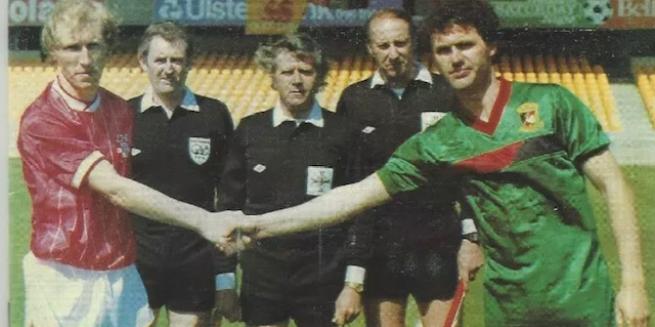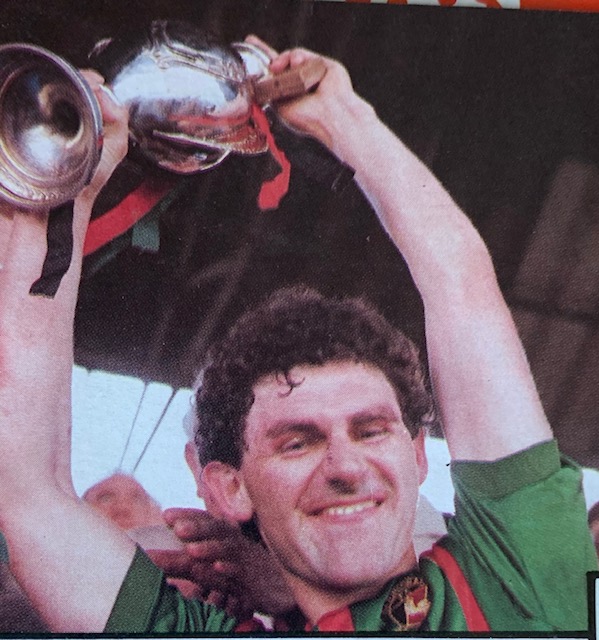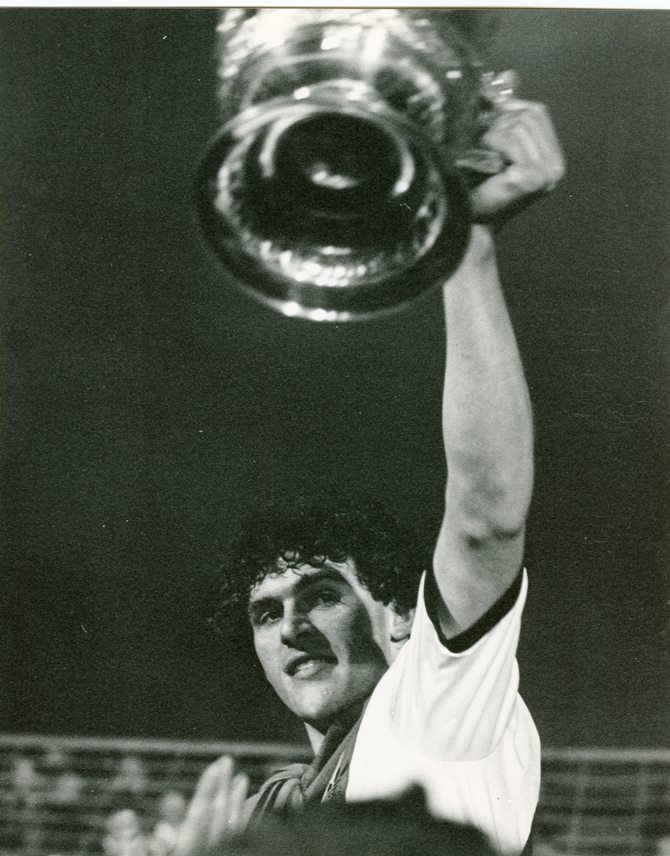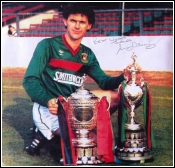
In this new series we plan to bring extended interviews with some of Glentoran’s greatest ever players, speaking to Media Director Ian Clarke about many interesting aspects of their long, trophy laden careers with the Glens.
Jim Cleary

There have been many iconic players to wear the Glentoran shirt since 1882, but some are in the very upper echelon of Glentoran Great. For anyone who was fortunate enough to watch our various teams through the 1980s, the name Jim Cleary holds a very special place. During his nine years at the Oval, Jim won a total nineteen trophies, including two league titles and five Irish Cups, and captaining us to fourteen of them. He won five caps for Northern Ireland, including selection of the squad for the 1982 World Cup Finals in Spain, and was voted Ulster Footballer of the Year. In nine seasons, Jim played for Glentoran 413 times, scoring 144 goals from the famous number six jersey. I have genuinely never seen anyone’s All Time Glentoran xi that didn’t have Jimmy Cleary on the left side of midfield. It’s hard to think of anyone more appropriate to kick off this news series:
How did your move to Glentoran come about in August 1980, and what swung it for you?
I’d played for Portadown for six years and latterly we had developed into a pretty good team, winning the Gold Cup, and getting to the Irish Cup Final. We had some very good players there including Billy Murray and Willie Gordon, who went on to do very well for Linfield, and of course Blackie who I came through with there. But I wanted to win more trophies and I was based in Belfast so a move to a Belfast club made sense.
Ronnie McFall was the manager who brought me to the Oval. I’d played with Ronnie for a few years at Portadown plus Blackie and Robert Strain, who I’d also played with had already joined him at the Oval. Ronnie actually came in for me a year earlier, not long after he’d signed Blackie, but I was having a benefit season and I didn’t want to leave just after that. But Ronnie being Ronnie he stuck at it and came back in for me that summer when he was strengthening his team.
Going to Glentoran was a very easy decision to make. I first played there for Portadown Reserves against a good Glens Seconds team with Andy Dougan up against me in midfield. On my first time there, the pitch was incredible. I’d never played on anything like it, so I was keen to play on it every other week. Plus, Ronnie always did a great sales job when he was trying to sign a player, so I was pretty easy to persuade.
How would you describe Glentoran when you arrived?
They’d had a very tough season and Ronnie knew he had a job on to get the Glens really challenging. Only Rab (McCreery) and the older Johnny Jamison were still there from the last great Glens team. Though we knew what he was doing, I was surprised at how quickly he moved and how many top-quality players came in so soon. I think I was playing for the Irish League at the start of August, so the season had started by the time I signed. I think he’d signed Strainer during the previous season then Paddy (Alan Paterson) and big Trevor Erskine, a centre half who was a good player but didn’t stay long in the summer but really that was it until Alan Harrison came in from Bangor the same day I signed from Portadown. Then Jamie (Johnny Jameson) came in from Linfield and we started to click.
A really massive signing was Terry Kingon who came in from Cliftonville a few weeks after I did. He was Portadown captain when Ronnie and I played there, and he was a ferocious tackler. It was very funny the way Kingy came in. We played at Cliftonville at the weekend and before the match Ronnie was talking him down the way managers do – “Kingon is done, he can’t run, he won’t get near you and so on”. Then we turned up the next Tuesday for training and there was Kingy in his Glens training gear, all signed and ready to go. That was Ronnie’s style. He really knew how to work the transfer market. Terry only stayed a couple of seasons because he was well into his thirties. But he was a pivotal signing because we’d lacked the sort of presence, he gave us in midfield, and he could bully other midfields very easily. Everyone was surprised how quickly we gelled that season, including me, but I think it started when Kingy came in.
That first season was the year we won the league unbeaten. What are your main memories of it?

Jim with his first Glentoran trophy, the League Championship, in April 1981
Believe it or not I have few really outstanding memories of it. It was just a great year playing in a very good team. One of the biggest, most important aspects of it was that we had very few injuries, and no serious ones. I think Ronnie used just fourteen or fifteen players all season as we had a very small squad. The record books will confirm it one way or the other, but I think we lost just four or five games all season. The difficulty was that each of them cost us a trophy. The Irish Cup defeat against Ballymena in the semi final of the Irish Cup was a hard one to take. A couple of really poor refereeing decisions cost us the replay, especially a winning penalty when Kingy just couldn’t get out of the way of a shot. Why that was so disappointing is that I’m confident if we’d got through that match, we’d have won the double. That’s how we all felt.
Despite how well we played all seasons, we stumbled a bit near the end – as we so often did - with a few draws, so we still had to beat Crusaders in the last match to win the league. But we did it well and it was a great experience so soon after joining the club.
How would you compare that team to your other league winning season in 1988, when we won the Double?
They were two very different teams and impossible to compare. As I said earlier 1981 was a newly assembled team but by the time we won the double the bulk of that team had been around the club for a while and Jacko (Tommy Jackson) was manager by then and we had strengthened over the previous few summers. Alfie Stewart and Raymond Morrison had come through the ranks and matured into very good players. Blackie was gone but we had Gary Macartney, Gerry Mullan and Ron Manley to pick from in attack with Jamie and I playing wide on the right and left. Also, Pat McCoy had come in from Crusaders and was doing well for us. We always scored a lot of goals, but I think the difference that season was that the defence was so tight. They were outstanding all season and very little got past them.
I loved captaining that team and captaining the Glens to the Double was massive for me. It was massive for the club since Glentoran hadn’t won it for so long. Also, it was special for the likes of myself, Paddy, Jamie, and Ron who’d experienced the disappointment of not winning it in 1981.
We won the Irish Cup five years out of six in the eighties. Why do you think we were so strong in the cup?
Jim with Paul Dixon in 1985 after captaining the Glens for the first of four times to an Irish Cup Final win
Man for man we were capable of comfortably beating anyone on our day and I think we were always so motivated for Irish Cup matches. We got to the semi final twice as well so that meant that for eight years in a row we were in the last four. When Coyler was at Linfield he always maintained we lacked a bit of resilience and that played into their hands, That’s probably fair because on a number of occasions we would play very well for months, get ourselves into the driving seat, then slip up against a team we should have expected to beat. That habit of losing what should have been winnable games undermined our confidence at some important times.
We were probably so good in the cup because we could always lift our game against good opposition and were always great in one off occasions. When you think about it all of our finals were against good teams, including two against Linfield that went to replays. They were all tough finals, but we always felt confident and we also had the big occasion players like Jamie and Gerry Mullan who could always deliver when we needed it in those games.
You played in a classic midfield – Jameson, Caskey, Morrison, Cleary – that produced memories very special to supporters of that era. How did it feel to play in such a perfect setup?
I played with an incredible number of great midfield players at Glentoran. In my time there was Kingy, Nuts, Casko, Barney Bowers, Pat McCoy, Davy Neill. Every one of them was very easy to play with and those midfields all scored plenty of goals as well. For most of my time Jamie was on the right and sometimes when I played more centrally Alfie Stewart would play on the left. He developed into a very good player there before moving to left back. Barney played a lot of his football at the back, but he was another great midfielder. Barney could slot into any role in the team but as a midfielder he was another one who scored a lot of important goals for us.
The one regret I have is that I didn’t get to play much with the older Johnny Jamison. I’d played him against him a lot and he was a great player. I was really looking forward to playing with him when I signed but he was away a few weeks after I joined. That was a pity.
How would you describe the different styles and strengths of the three managers you played for at the Glens?
You’d need to make that four! After Ronnie went Bimbo Weatherup took us on for an extended caretaker run and did brilliantly. We had a great unbeaten run with Bimbo and during that time the team got a lot of confidence restored. Bimbo is a true Mr Glentoran. He knew everything about the club and had a great love of it. That came across very well when he managed us, and I think we responded to it.
Ronnie was great. He gets credit for bringing a great group of players together, and he did. But there was a lot more to him that just an eye for a player. He knew exactly what he wanted from each of us and was very clear in his instructions to each of us. Ronnie started a very special time at the Glens and I still feel he was sacked too early.
Billy Johnston was also a very good manager. I was delighted Billy got the job. I already knew him pretty well as he worked with my wife at BIFHE. He’d a great playing background and had done very well as a manager before he joined us. Billy had won the league twice with Crusaders and he had very high expectations of the sort of football we should play. When it worked, we were at our very best, but that style didn’t always work over the course of a full league season. I enjoyed working with Billy and in his couple of years we continued winning a lot of the knock out cups.
Tommy Jackson came in after Billy and added a real resilience to the team. He was never scared to take difficult decisions. He dropped me early on. He was right to do it and it was good for me. Tommy had a great Glentoran pedigree, but he had also played at a very high level for Man United and Everton, had a lot of Northern Ireland caps and had done very well as a manager at Waterford and Crusaders before joining us. In fact, I think we won the Gold Cup or Ulster Cup for Crusaders, beating us in the final when we were clear favourites. So, Tommy was someone you would have to listen to when he talked about football.

Still the most recent Glentoran captain to win the double
Many people say you retired very early. I felt your last season (1988-89) was one of your personal best, scoring 25 goals from midfield. What motivated you to retire that season?
It wasn’t a spur of the moment decision. I’d pretty much decided the previous summer and a few months into the season I told Tommy and Billy McCullough to give then a chance to prepare and look =for someone for my position. There was no real story behind it. I was coming thirty-three and had played first team football for fifteen full years. I was at a point in my life when I felt I’d done enough in football. Tommy did everything he could to persuade me to stay on, but I had reached a decision and I was happy to see it through.
Finally, how do you feel about the current situation at the club
It’s all very positive. Getting the debt cleared was a massive development. As a Glenman the whole thing hung over my shoulders for years, just as it did for everyone else. I have always attended plenty of Glens matches and I think we all found it difficult to watch, with little real hope for improvement. But the squad has been very impressive this season and there’s a very good feeling that Glentoran are getting back to challenging for the big trophies. I’m just disappointed the season was interrupted because we were going well, and the league and cup were so competitive. But there’s a lot to look forward to when football restarts.
That’s the general feeling I get from other former players. Philip Stevenson has an ex-players' WhatsApp group with over sixty of us in it from different generations and there’s a lot of excitement there about the future. When you’ve played for Glentoran you’re always committed. You never lose it.
Next Week: Colin Nixon




